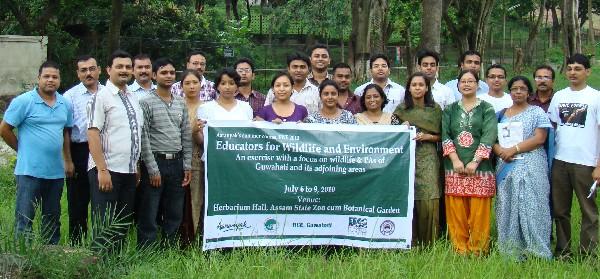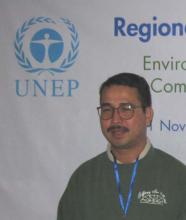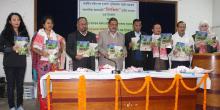A training course equipped with applied and innovative techniques was organised by Aaranyak, a leading society for bio-diversity conservation, in collaboration with Assam State Zoo cum Botanical Garden, Regional Centre of Expertise (RCE), Guwahati and with support from Environment Education Conservation Global (EECG),USA and the Assam Science Technology and Environment Council (ASTEC) in Assam State Zoo campus here during July 6 to 9 with an objective to create a new pool of environment educators for promotion of conservation of natural resources and wildlife. Prior to the training programme all participants were engaged in online activities like problem identification and making suggestion for solution, conceptualising posters on wildlife and environment issues etc.
A select group of environment educators including Students, teachers and researchers from various fields participated in the four-day training programme termed as ‘Educators for Wildlife and Environment’(EWE) , the workshop focused on teaching participants various aspects like effective presentations on environment issues , preparing for press briefings , journaling, designing teaching learning materials, documentation, designing environment education modules.
The programme was inaugurated on July 6 by Dr S K Choudhury, Director, ASTEC, who highlighted the need for promoting environment education at this juncture and need to set up eco clubs in school level. “We need more number of workers than thinkers to facilitate conservation of our environment,” he said.
Narayan Mahanta, DFO, Assam State Zoo cum Botanical Garden, in his speech briefed the participants on the need of sensitizing the masses especially students on wild life related issues and environment degradation. The highlight of the training was a visit to the Amchang Wildlife Sanctuary just about ten kilometres from Guwahati where the participants were introduced to the treasure trove of rich flora and fauna of the area. Prior to the visit the Participants were given an introductory presentation about Amchang Wildlife Sanctuary by Mr Pankaj Sharma, Assistant Conservator of Forests (ACF), Guwahati wildlife division. During the exposure visit to Amchang WLS, Ashok Das, range officer highlighted the ecological importance and natural beauty of the sanctuary where Ajoy Kr Das has briefly interact with the participants in legal aspects.
During the training various aspects of environmental education and wildlife conservation were discussed. One of the prominent presentations was made by Narayan Mahanta on wildlife and protected areas of Guwahati and its adjoining areas. He stressed on the need of conservation of the rich biodiversity of the area.
The secretary general of Aaranyak, Dr Bibhab Talukdar in his presentation enlightened on delivering effective lectures on environment related issues. He gave valuable tips on techniques of effective delivery so as to attract the proper attention of the audience.
Senior biologist of Aaranyak, Dr Firoz Ahmed made a power point presentation on planning issue based campaigns focusing on aspects like objectives, audience, message and media.
Udayan Borthakur, wildlife biologist of Aaranyak, in his presentation highlighted the importance of avifauna as a tool for effective environment education. Naba Krishna Nath, researcher of Aaranyak sensitised the participants on the importance of networking and strategic planning for environment education programmes. Dhrubajyoti Kalita gave tips to participants on documentation models. Pranabjyoti Kalita, district programme officer of SSA, North Cachar Hills district briefed the participants on teaching-learning tools in respect of environment education.
Noted environment educator Memma Singha played a vital role in involving the participants in various environmental games throughout the four-day training.
Another major highlight of the training programme was that all the participants were facilitated to act as moderator in free-thinking sessions which was evaluated by Dr Bibhuti P Lahkar, Memma Singha and Dr Anjan Talukdar.
It is worth to mention that the EWE course module was developed by Jayanta Kumar Pathak and Firoz Ahmed on behalf of Aaranyak. Besides, Mr Pathak had coordinated the entire training programme.
The workshop came to an end with a colourful ceremony organised by the participants where the certificates were distributed. In concluding speech, Dr Bibhab Talukdar assured the participants to hold such workshops at regular intervals. The concluding ceremony was also graced among others by Narayan Mahanta and Dr Archana Goswami, secretary, RCE, Guwahati Mahanta in his speech appealed to the schools in Guwahati to utilize the facilities and infrastructure of the state Zoo for environmental education of student as one of the mandate of the state zoo is to sensitise people on environment conservation.






Add new comment